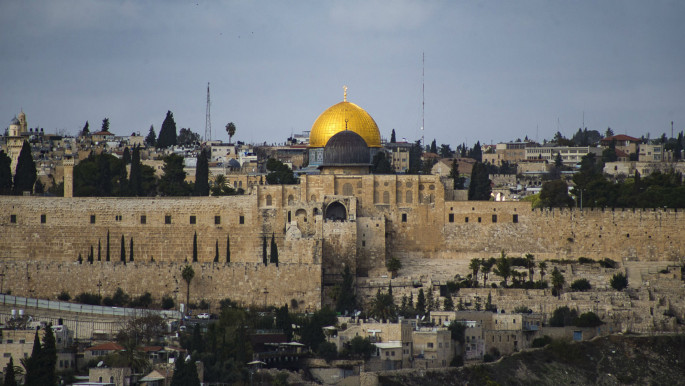Haley drops hints about Trump's Middle East peace plan
US Ambassador Nikki Haley dropped a few hints about Donald Trump's peace plan for Israel and the Palestinians on Tuesday, in her last speech to the Security Council's monthly meeting on the Middle East.
Without divulging specific details, Haley said the long plan takes advantage of new technology and contains a lot both sides will like and things they won't like.
Haley said Israelis, Palestinians and countries around the world have a choice: focus on the parts they dislike, which she said means returning "to the failed status quo of the last 50 years", or focus on parts they like and encourage peace negotiations to move forward.
The US envoy to the UN, who steps down at the end of the month, told the UN Security Council that "both sides would benefit greatly from a peace agreement, but the Palestinians would benefit more, and the Israelis would risk more".
Prior to the meeting, eight European Union members stood outside the Security Council chamber and read a joint statement emphasising the EU's "strong and continued commitment" to the internationally agreed requirements for Israeli-Palestinian peace - an apparent message to the Trump administration.
"The EU is truly convinced that the achievement of a two-state solution based on the 1967 borders with Jerusalem as the capital of both states, that meets Israeli and Palestinian security needs, and Palestinian aspirations for statehood and sovereignty, ends the occupation and resolves all final status issues... is the only viable and realistic way to end the conflict and achieve just and lasting peace," the statement said.
 |
|
| Nikki Haley has served as US envoy in a period that has seen Washington make unprecedented moves in favour of Israel [Getty] |
Haley made no mention of any of these issues, however stressed instead the "unshakeable bond" between the US and Israel.
"Given my record, some might mistakenly conclude that I am unsympathetic to the Palestinian people," she said. "Nothing could be further from the truth."
"Israel wants a peace agreement but it does not need one," she added.
On the other hand, Haley said, the Palestinian people "are suffering terribly, while their leadership clings to 50-year-old demands that have only become less and less realistic," and a peace agreement holds the prospects "of a massive improvement in the quality of their lives and far greater control over their political future".
She said "it is with this backdrop in mind that the Trump administration has crafted its plan for peace between Israel and the Palestinians".
US President Donald Trump calls the plan - drafted by a team headed by his son-in-law Jared Kushner and adviser Jason Greenblatt - the "Deal of the Century".
The plan is expected to be unveiled by Washington in early 2019.
Managing - not resolving - conflict
Nikolay Mladenov, the UN Mideast envoy, told the council he "remains concerned by the weakening of international consensus and the absence of collective efforts to achieve an end to the (Israeli) occupation and the realisation of a negotiated two-state resolution of the Israeli-Palestinian conflict".
"At the end of 2018, we are nowhere closer to reviving efforts for a negotiated solution," he said. "Without a political horizon, all our collective and individual efforts merely contribute to managing the conflict rather than resolving it."
Mladenov also reported to the council on Israel's compliance with a December 2016 resolution that condemned Israeli settlements in lands the Palestinians want to include in their future state and said the settlements have "no legal validity." The resolution demanded a halt to such activities for the sake of "salvaging the two-state solution".
 |
Without a political horizon, all our collective and individual efforts merely contribute to managing the conflict rather than resolving it |  |
The UN Mideast coordinator said Israel has taken "no steps" to comply with the resolution and has continued expanding settlements and constructing new ones.
Over the past year, he said that "although Gaza has been the most volatile, the risk of an explosion in the West Bank has also grown".
Mladenov warned that "the dangerous escalation of terrorist attacks, clashes and violence in the West Bank" in the past days and weeks have led to deaths of Israeli and Palestinian civilians and Israeli soldiers.
Israeli security measures following these incidents, its search operations in the West Bank city of Ramallah, as well as clashes and protests that turned violent "are adding to an already tense atmosphere," he said.





 Follow the Middle East's top stories in English at The New Arab on Google News
Follow the Middle East's top stories in English at The New Arab on Google News
![The UAE is widely suspected of arming the RSF militia [Getty]](/sites/default/files/styles/image_330x185/public/2024-11/GettyImages-472529908.jpg?h=69f2b9d0&itok=Yauw3YTG)
![Netanyahu furiously denounced the ICC [Getty]](/sites/default/files/styles/image_330x185/public/2024-11/GettyImages-2169352575.jpg?h=199d8c1f&itok=-vRiruf5)
![Both Hamas and the Palestinian Authority welcomed the ICC arrest warrants [Getty]](/sites/default/files/styles/image_330x185/public/2024-11/GettyImages-2178351173.jpg?h=199d8c1f&itok=TV858iVg)